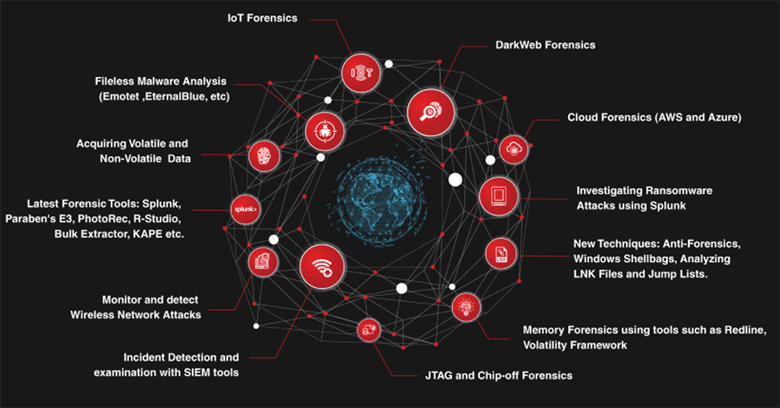EC-Council’s Certified Hacking Forensic Investigator (CHFI) is the only comprehensive ANSI accredited, lab-focused program in the market that gives organizations vendor-neutral training in digital forensics. CHFI provides its attendees with a firm grasp of digital forensics, presenting a detailed and methodological approach to digital forensics and evidence analysis that also pivots around Dark Web, IoT, and Cloud Forensics. The tools and techniques covered in this program will prepare the learner for conducting digital investigations using ground-breaking digital forensics technologies.
The program equips candidates with the necessary skills to proactively investigate complex security threats, allowing them to investigate, record, and report cybercrimes to prevent future attacks.
"Every crime leaves a digital footprint, and we have the skills to track those footprints. Every crime leaves a digital trail and with EC Council’s CHFI v10, you will learn to unravel these pieces of evidence, decode them and report them. From decoding a hack to taking legal action against the perpetrators, you will be an active respondent in times of cyber-breaches."

The program is designed for IT professionals involved with information system security, computer forensics, and incident response. It will help fortify the application knowledge in digital forensics for forensic analysts, cybercrime investigators, cyber defense forensic analysts, incident responders, information technology auditors, malware analysts, security consultants, and chief security officers.
Who Is It For?
It is strongly recommended that you have attended the CEH class (Certified Ethical Hacker) before enrolling into CHFI program.
CHFIv10 curriculum consists of 16 instructor-led training modules:
Module 01: Computer Forensics in Today’s World
Module 02: Computer Forensics Investigation Process
Module 03: Understanding Hard Disks and File Systems
Module 04: Data Acquisition and Duplication
Module 05: Defeating Anti-Forensics Techniques
Module 06: Windows Forensics
Module 07: Linux and Mac Forensics
Module 08: Network Forensics
Module 09: Investigating Web Attacks
Module 10: Dark Web Forensics
Module 11: Database Forensics
Module 12: Cloud Forensics
Module 13: Investigating Email Crimes
Module 14: Malware Forensics
Module 15: Mobile Forensics
Module 16: IoT Forensics
The CHFI certification is awarded after successfully passing exam EC0 312-49.
Exam is optional and the exam fee is NOT included in the price).
You can book and take the exam at Glasspaper`s test center in Oslo, Bergen, Trondheim or Stavanger.
CHFI Exam Details:
Number of Questions: 150
Test Duration: 4 hours
Test Format: Multiple Choice
Test Delivery: ECC exam portal
Passing Score
In order to maintain the high integrity of our certification exams, EC-Council Exams are provided in multiple forms (i.e., different question banks). Each form is carefully analyzed through beta testing with an appropriate sample group under the purview of a committee of subject matter experts, ensuring that each of our exams is not only academically sound, but also has “real world” applicability. We apply an internal process to determine the difficulty rating of each question. The individual rating then contributes to an overall “Cut Score” for each exam form. To ensure each form has equal assessment standards, cut scores are set on a “per exam form” basis. Depending on which exam form is challenged, cut scores can range from 60% to 78%.